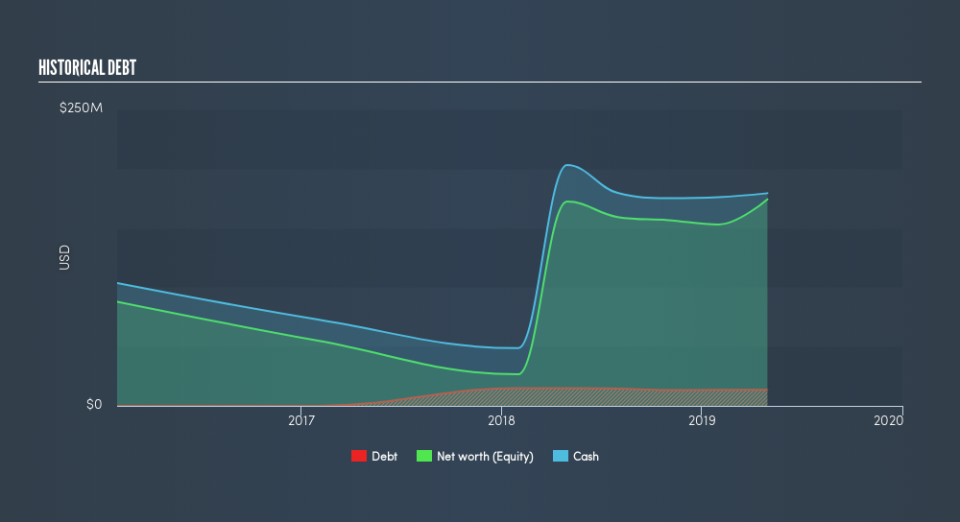Is Zuora (NYSE:ZUO) Using Debt In A Risky Way?

Legendary fund manager Li Lu (who Charlie Munger backed) once said, 'The biggest investment risk is not the volatility of prices, but whether you will suffer a permanent loss of capital.' So it seems the smart money knows that debt - which is usually involved in bankruptcies - is a very important factor, when you assess how risky a company is. We note that Zuora, Inc. (NYSE:ZUO) does have debt on its balance sheet. But the real question is whether this debt is making the company risky.
Why Does Debt Bring Risk?
Generally speaking, debt only becomes a real problem when a company can't easily pay it off, either by raising capital or with its own cash flow. Ultimately, if the company can't fulfill its legal obligations to repay debt, shareholders could walk away with nothing. While that is not too common, we often do see indebted companies permanently diluting shareholders because lenders force them to raise capital at a distressed price. By replacing dilution, though, debt can be an extremely good tool for businesses that need capital to invest in growth at high rates of return. The first step when considering a company's debt levels is to consider its cash and debt together.
See our latest analysis for Zuora
What Is Zuora's Net Debt?
You can click the graphic below for the historical numbers, but it shows that Zuora had US$9.64m of debt in April 2019, down from US$16.1m, one year before. However, its balance sheet shows it holds US$179.3m in cash, so it actually has US$169.7m net cash.
A Look At Zuora's Liabilities
Zooming in on the latest balance sheet data, we can see that Zuora had liabilities of US$134.2m due within 12 months and liabilities of US$14.8m due beyond that. On the other hand, it had cash of US$179.3m and US$56.7m worth of receivables due within a year. So it actually has US$87.0m more liquid assets than total liabilities.
This short term liquidity is a sign that Zuora could probably pay off its debt with ease, as its balance sheet is far from stretched. Simply put, the fact that Zuora has more cash than debt is arguably a good indication that it can manage its debt safely. The balance sheet is clearly the area to focus on when you are analysing debt. But ultimately the future profitability of the business will decide if Zuora can strengthen its balance sheet over time. So if you want to see what the professionals think, you might find this free report on analyst profit forecasts to be interesting.
Over 12 months, Zuora reported revenue of US$247m, which is a gain of 31%. Shareholders probably have their fingers crossed that it can grow its way to profits.
So How Risky Is Zuora?
Statistically speaking companies that lose money are riskier than those that make money. And we do note that Zuora had negative earnings before interest and tax (EBIT), over the last year. Indeed, in that time it burnt through US$31m of cash and made a loss of US$80m. But the saving grace is the US$179m on the balance sheet. That kitty means the company can keep spending for growth for at least five years, at current rates. With very solid revenue growth in the last year, Zuora may be on a path to profitability. By investing before those profits, shareholders take on more risk in the hope of bigger rewards. When I consider a company to be a bit risky, I think it is responsible to check out whether insiders have been reporting any share sales. Luckily, you can click here ito see our graphic depicting Zuora insider transactions.
When all is said and done, sometimes its easier to focus on companies that don't even need debt. Readers can access a list of growth stocks with zero net debt 100% free, right now.
We aim to bring you long-term focused research analysis driven by fundamental data. Note that our analysis may not factor in the latest price-sensitive company announcements or qualitative material.
If you spot an error that warrants correction, please contact the editor at editorial-team@simplywallst.com. This article by Simply Wall St is general in nature. It does not constitute a recommendation to buy or sell any stock, and does not take account of your objectives, or your financial situation. Simply Wall St has no position in the stocks mentioned. Thank you for reading.

 Yahoo Finance
Yahoo Finance 
